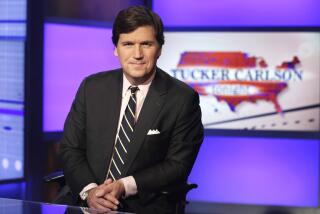Soviet ‘Spin Doctors’ Set Up Shop but They Fail to Strike Sparks : Summit: High-glitz press briefings get under way in Washington, but so far little news has surfaced. : The Washington Summit. Dealing with the New Reality
- Share via
WASHINGTON — With the superpower summit only days away, the Soviet Union cranked up its public relations campaign Saturday with the first in a series of high-glitz press briefings designed to buff the gloss on glasnost.
The Soviet media machine ran smoothly enough, but it seemed to leave some American news correspondents less than satisfied. While the five Soviet experts who presided over the first session were eager to respond, they had little in the way of news to offer.
The five daily briefings, being held at the National Press Club in downtown Washington, will deal with the subjects of Soviet political reform, economic restructuring, human rights, foreign policy and independence movements.
The last session will be Wednesday, only hours before Soviet President Mikhail S. Gorbachev arrives in Washington for four days of meetings with President Bush.
The briefings--complete with glossy press kits, high-profile Soviet experts and fresh coffee--illustrate Moscow’s improved image management, a science born with Gorbachev’s policy of glasnost , or openness, and developed over the course of five previous summits.
At Saturday’s briefing, which ostensibly focused on political reform, the five Soviets fielded questions on topics ranging from Gorbachev’s controversial new economic plan to the availability of free abortions to Soviet women.
Andrei S. Grachev, a Soviet spokesman, directed the disparate gathering. The briefing, attended by several dozen reporters, appeared to be designed less to make news than to make friends.
“I think we are all interested in the food situation,” one reporter ventured. “What are you getting from the United States now in the way of food, and what do you need?”
“The main thing we would like from the United States is a new spirit, a new style of relations,” Grachev answered, proceeding to speak of U.S.-Soviet relations in general terms as an official interpreter provided a simultaneous translation into English.
“I don’t understand,” the reporter persisted. “Can you tell us what you all need, what you want?”
Just “to be on good terms,” Grachev finally responded, switching in exasperation to English.
The Soviet experts were carefully chosen to represent a range of views and experience. The most prominent was Alexander Bovin, a stout, peppery political commentator for the government newspaper Izvestia, who criticized Soviet inertia in guaranteeing freedom of the press. So far, he said, there is only “semi- glasnost. “
He also cautioned reporters not to read too much into Soviet actions, including the recent decision to hold a referendum on Gorbachev’s new economic program. “Sovietologists look for logic in the actions of the Kremlin,” he said, “but there is no logic in life and there is no logic in this situation.”
Yuri Golik, chairman of the Law and Order and Battle Against Crime Committee in the Supreme Soviet, drew smiles with his response to a question on whether domestic troubles have caused the Soviet people to become less interested in international affairs.
“I do not think our interest is shrinking,” he said. “In the first quarter of this year the amount of money spent on foreign trips is 20 times what it was last year.”
Bikhodzhal Rakhimova, vice chairwoman of the Supreme Soviet’s Committee on Women’s Affairs and Family, Mother and Child Protection, was the only woman and the only non-Russian to serve on the panel. Asked about independence sentiment in her native region of Central Asia, she responded diplomatically that it is important to remember that all of the region’s economic development occurred under Soviet rule. As for secession, she said, “The Supreme Soviet has passed a law on this question.”
More to Read
Sign up for Essential California
The most important California stories and recommendations in your inbox every morning.
You may occasionally receive promotional content from the Los Angeles Times.










